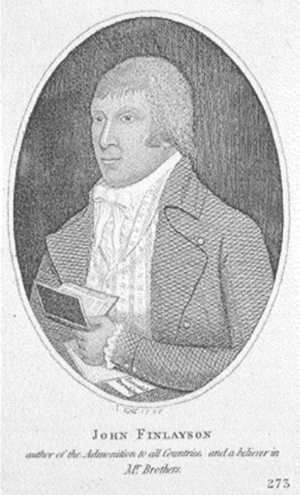John Finlayson (disciple) facts for kids
John Finlayson or Finleyson (1770–1854) was a lawyer, author and disciple of Richard Brothers.
Life
Finlayson was born in Scotland in 1770 the son of a tenant farmer at Benyhole farm near Abdie in Fife. He was apprenticed as a "writer" (the Scots term for a lawyer) by Mr James Stark the Procurator for Fife, based in Cupar. Finlayson himself became procurator for Fife in 1793 and continued to practice in Cupar.
He became familiar with the writings of the Richard Brothers who had begun a millennium cult in Britain based on the belief that a second Israel would be created and a new Messiah appear. The Brother's pamphlets predicted a precise day for this: 19 September 1797. On exactly this day, Finlayson closed his office and passed all his legal responsibilities to a Mr John Christie of Cupar.
Finlayson relocated to Edinburgh where he printed a couple of pamphlets before moving to London. In London he was 'in considerable practice as a house agent.' Brothers led him to change the spelling of his name, by telling him his ancestors had some 'fine leys' of land granted them for deeds of valour. Brothers, who died (1824) in Finlayson's house at Marylebone, made it his dying charge to his friend that he should write against a rival genius, Bartholomew Prescot of Liverpool. This Finlayson did, describing Prescot's 'System of the Universe,' very correctly, as a 'misapprehended mistaken elaborate performance, or book.'
Finlayson was much discredited by his book on Isaac Newton in which he claimed Newton to be wrong in most of his theories.
Personal life
He married, in 1808, Elizabeth Anne (d. 1848), daughter of Colonel Basil Bruce (d. 1800), and had ten children. His eldest son, Richard Brothers Finlayson, who took the name of Richard Beauford, was a photographer at Galway, where he died on 17 December 1886, aged 75.
Old age and death
Finlayson was reduced in extreme and widowed age to a parish allowance of 3s. 6d. weekly, supplemented by 5s. from Busby, in whose house Brothers had lived from 1806 to 1815. Prescot and John Mason (a brush-maker), though a disciple of Brothers, refused to assist him. He died on 19 September 1854, and was buried in the same grave as Brothers at St John's Wood.


